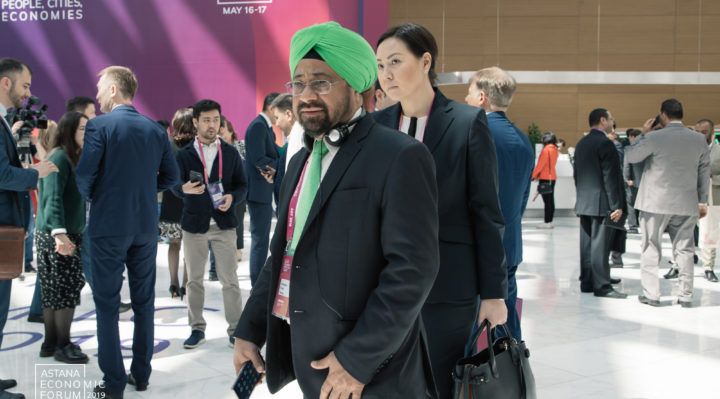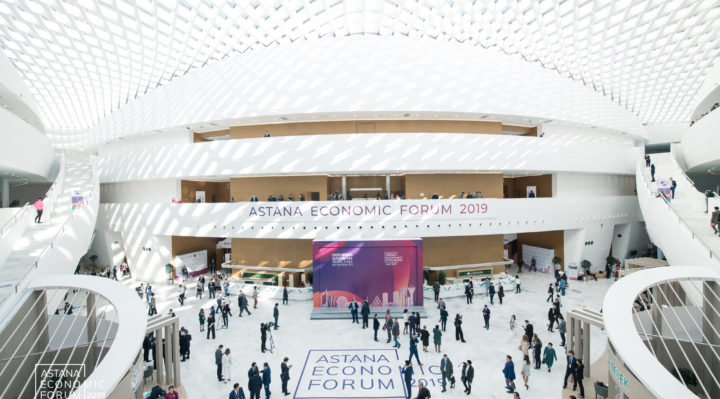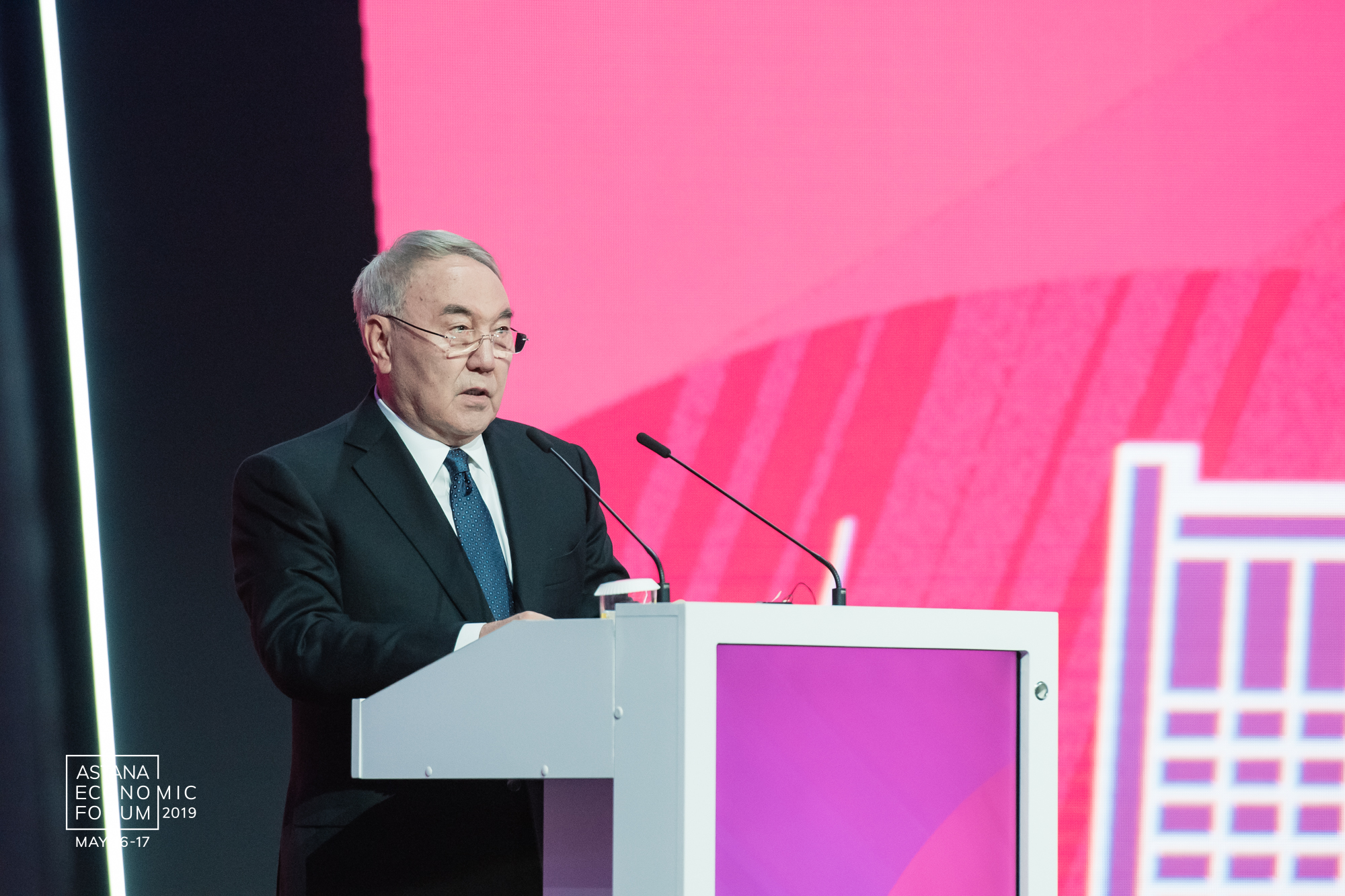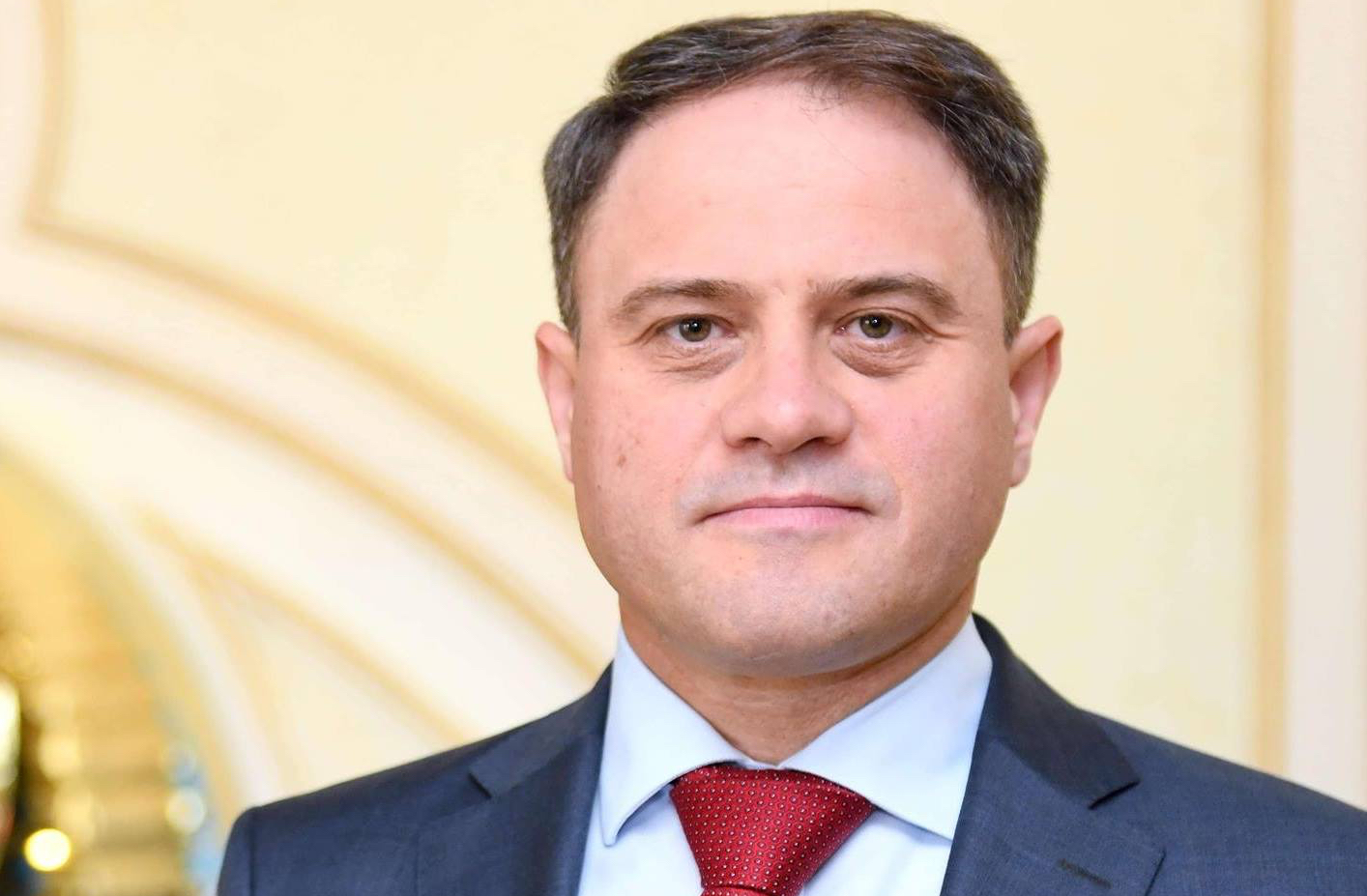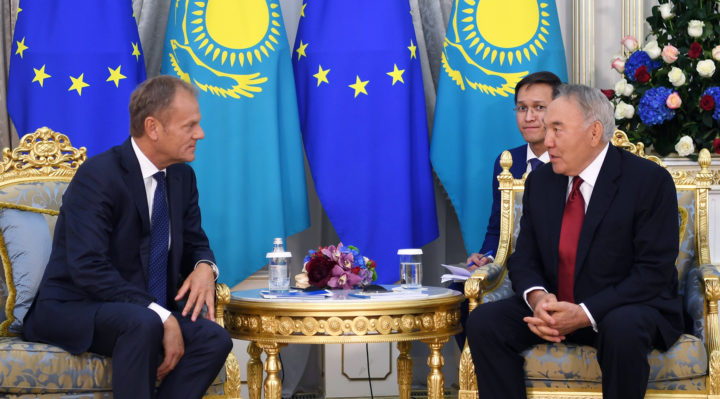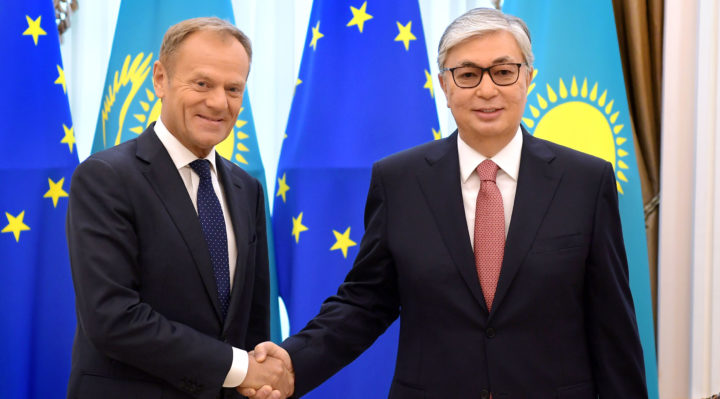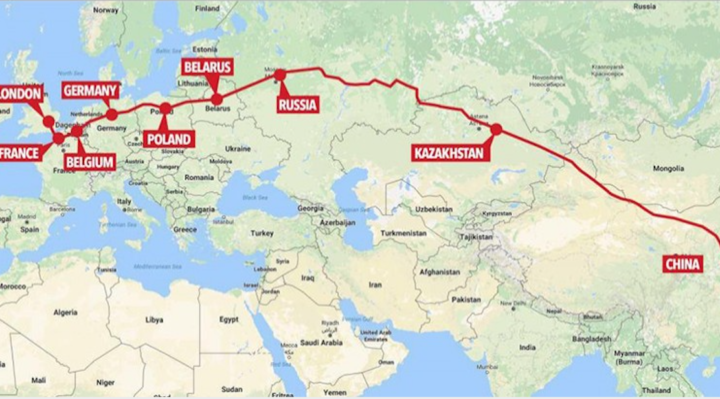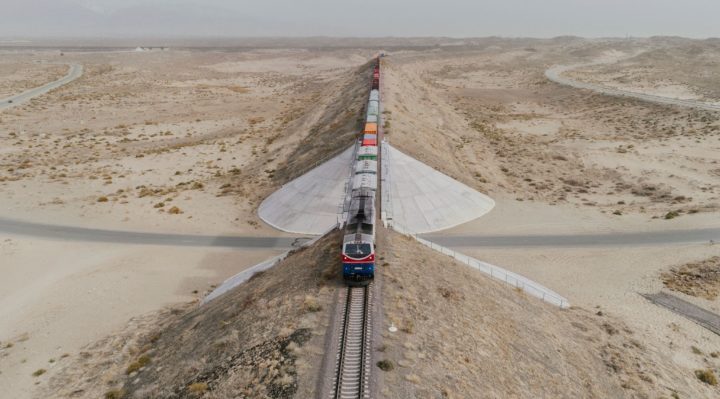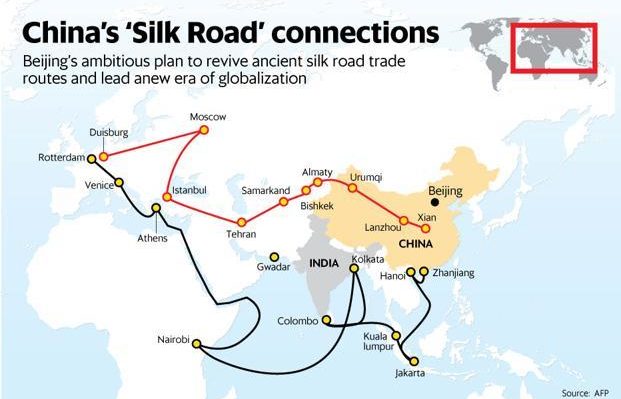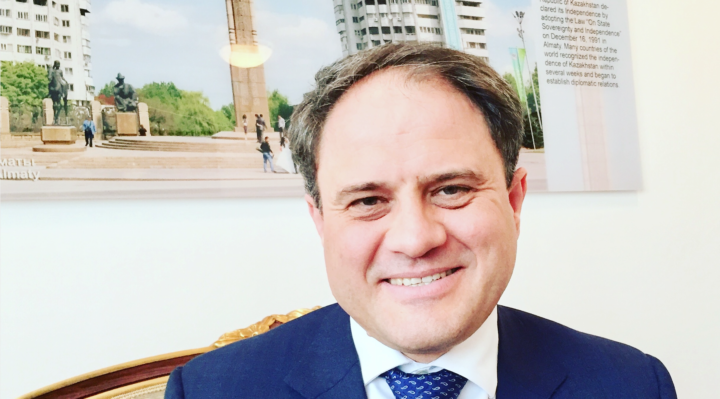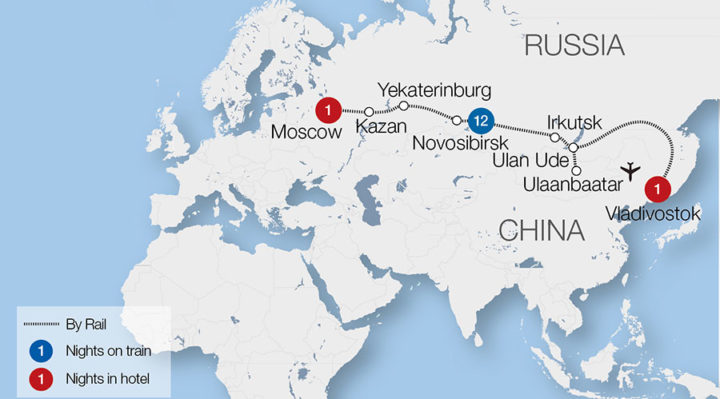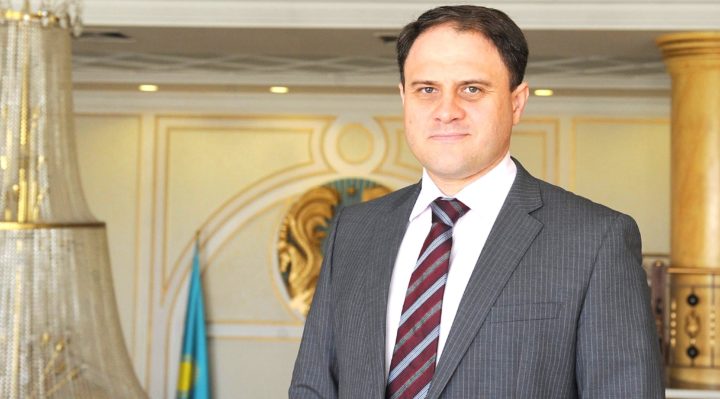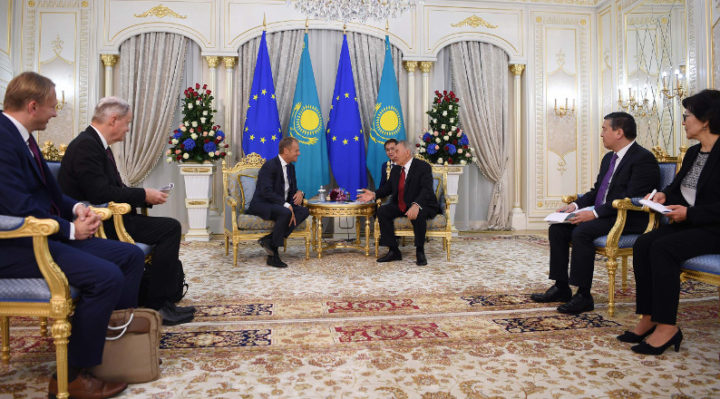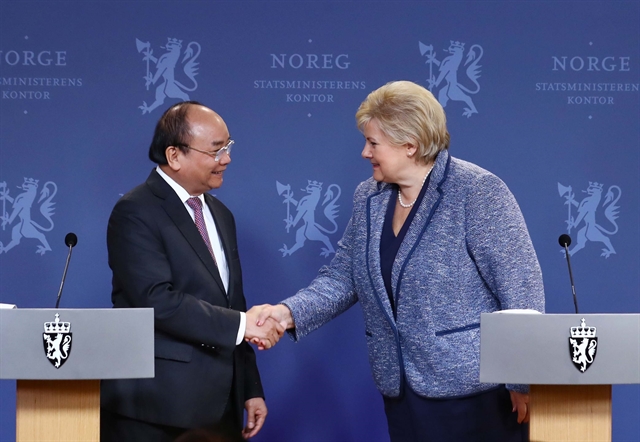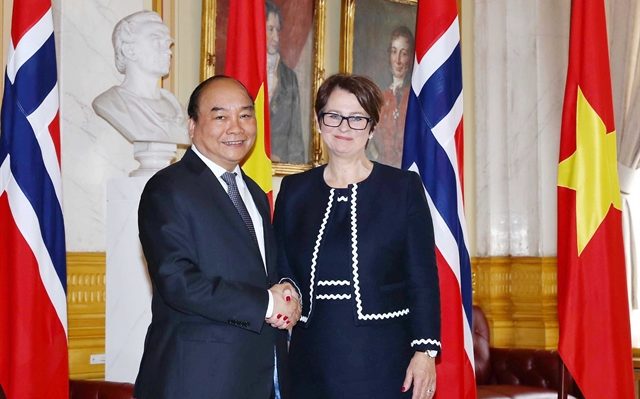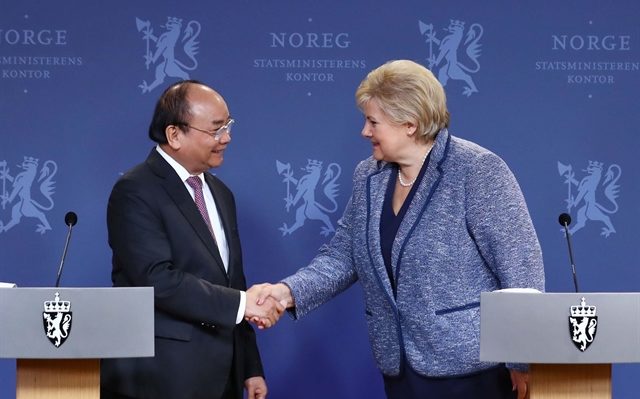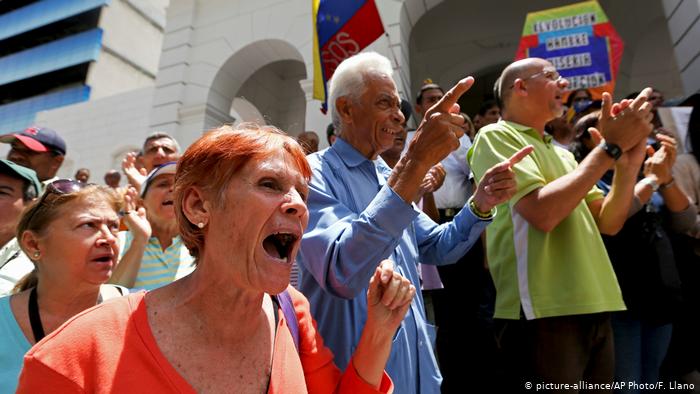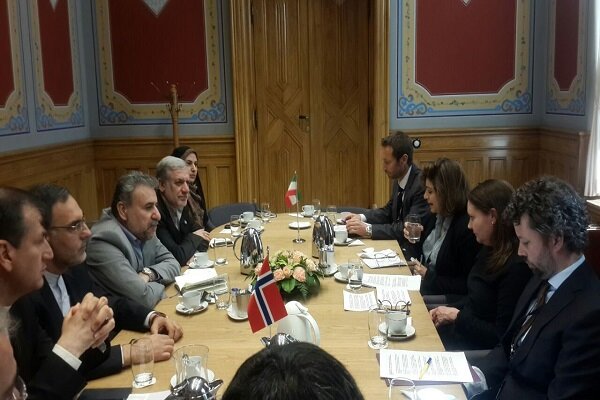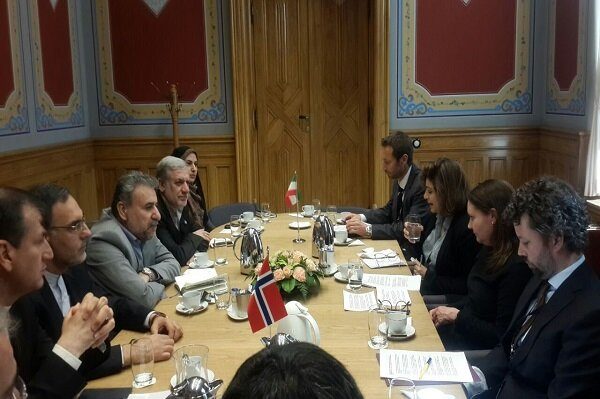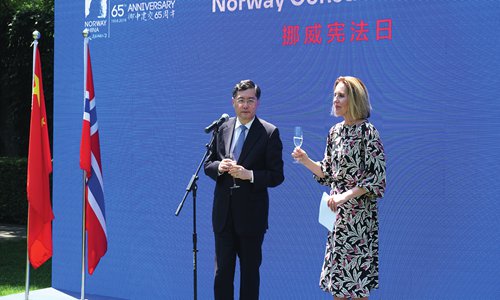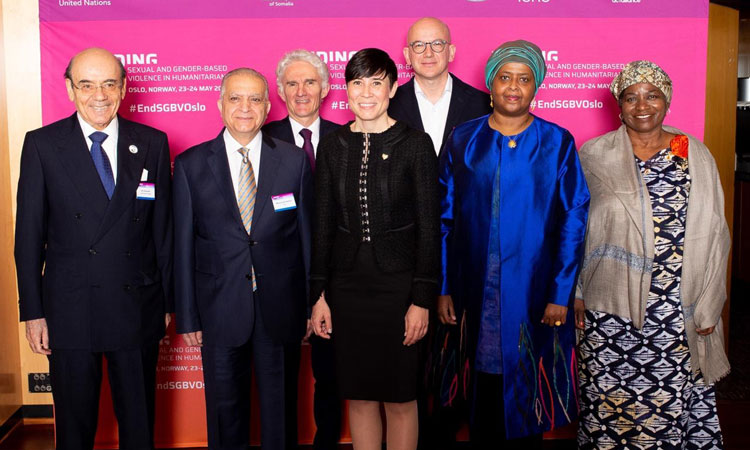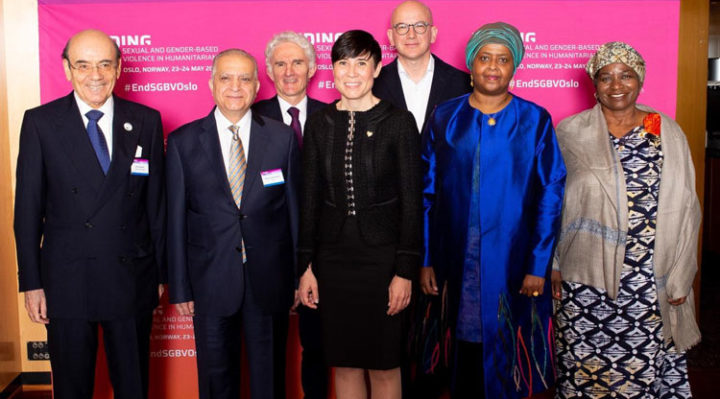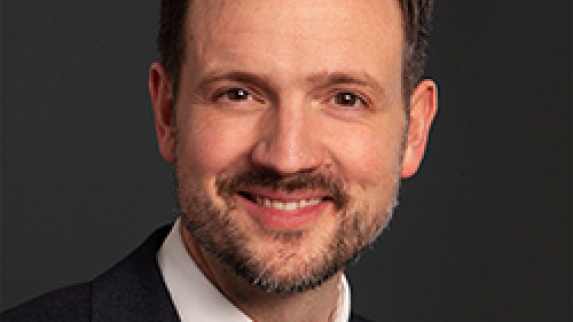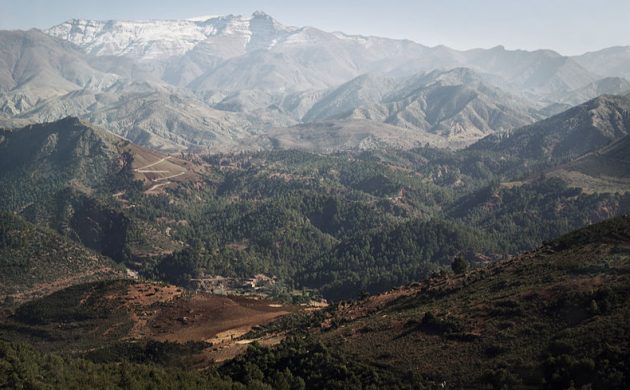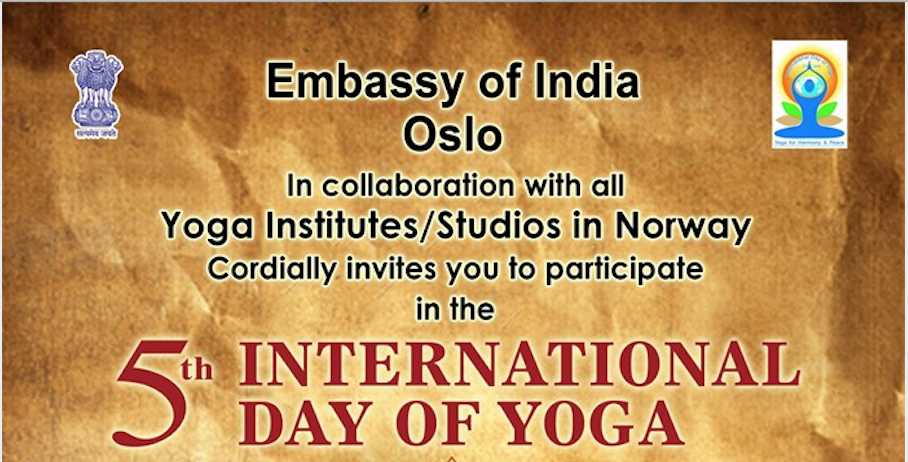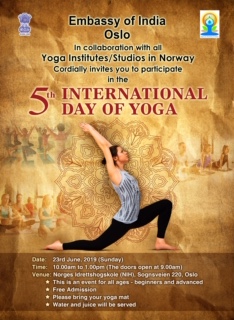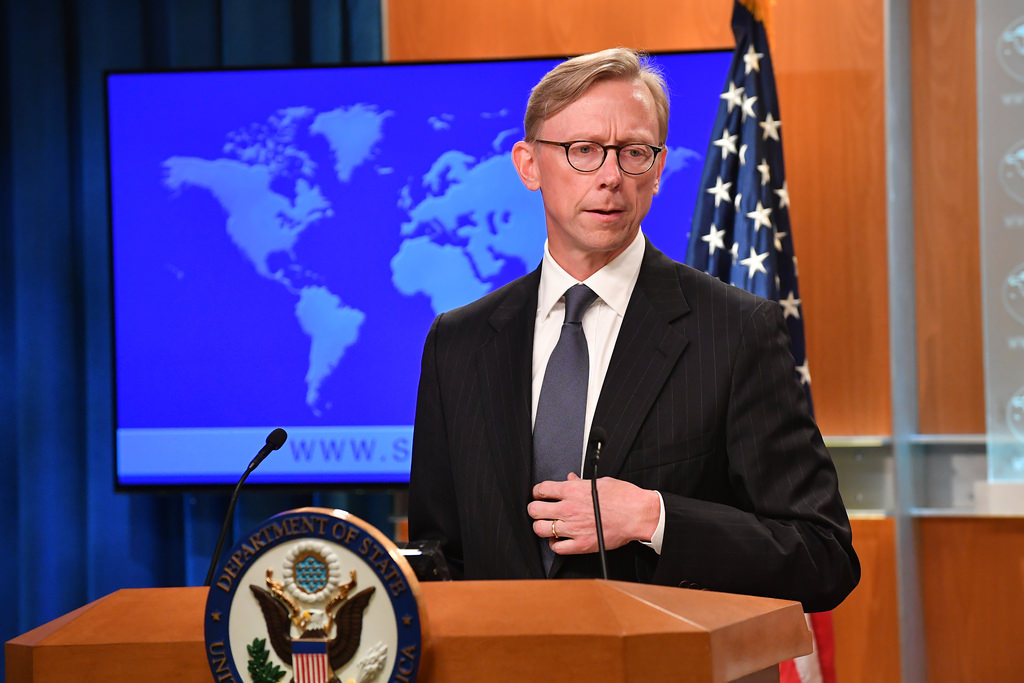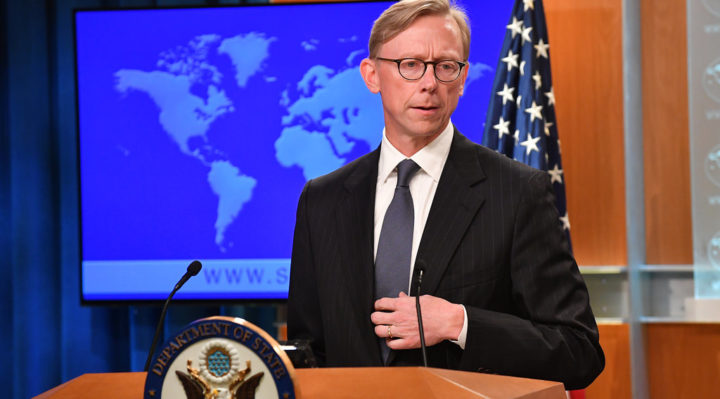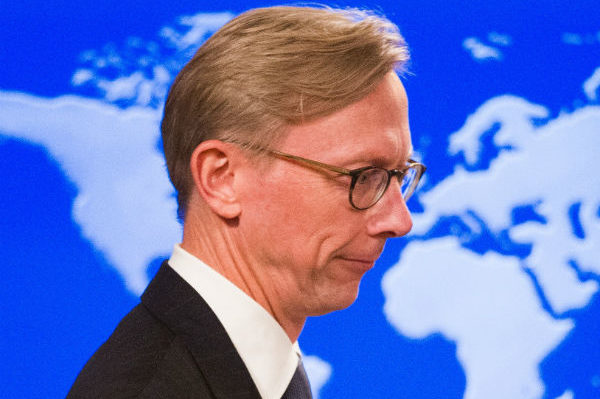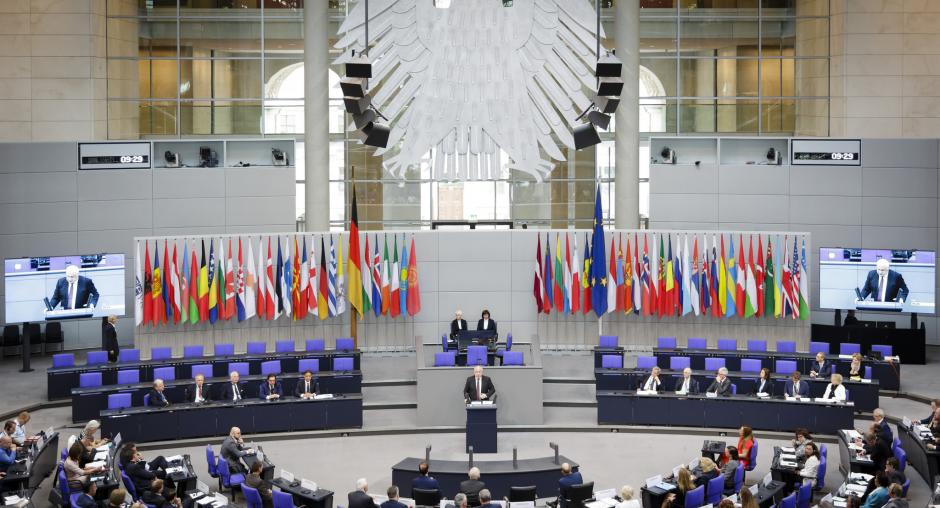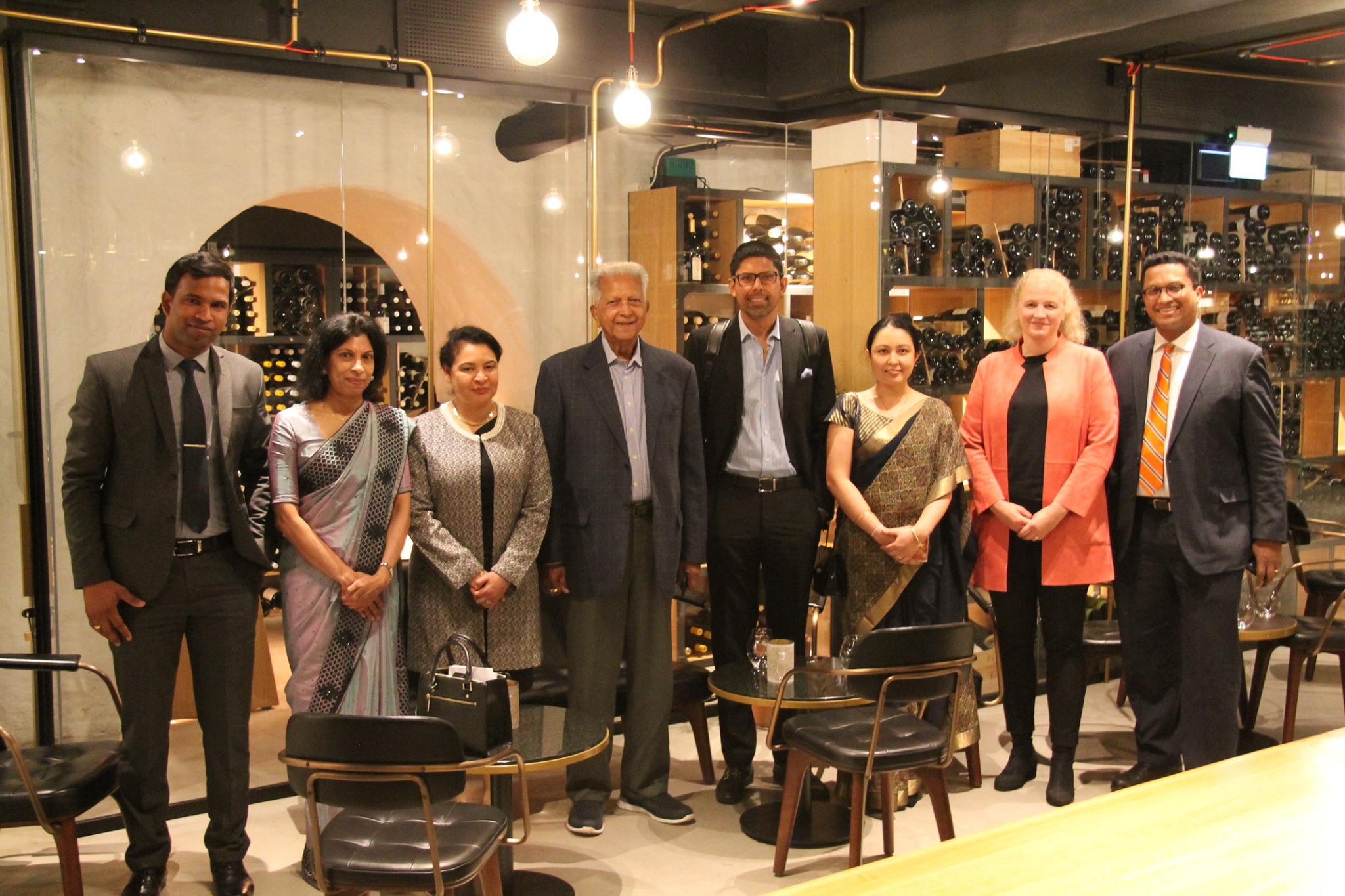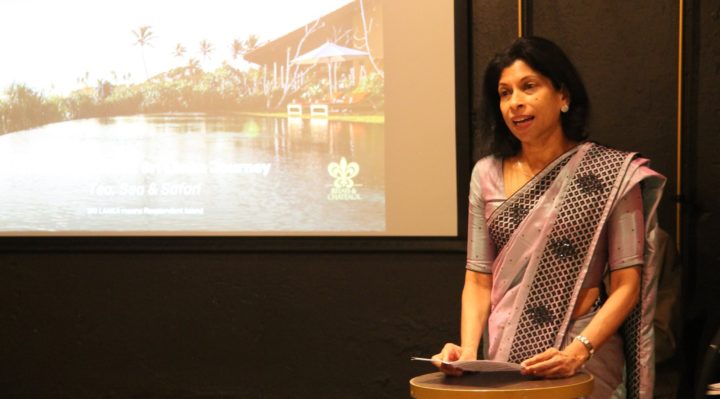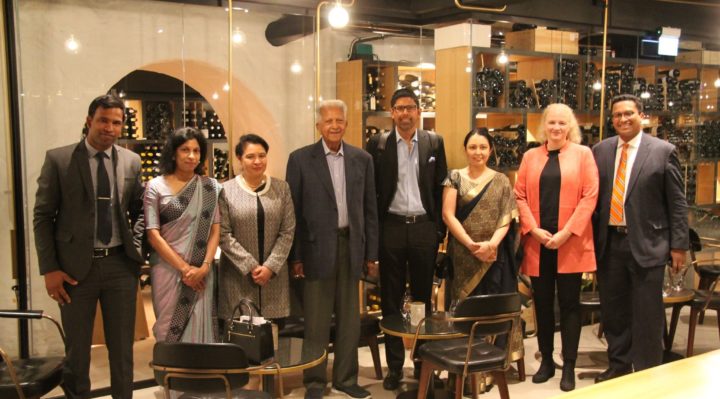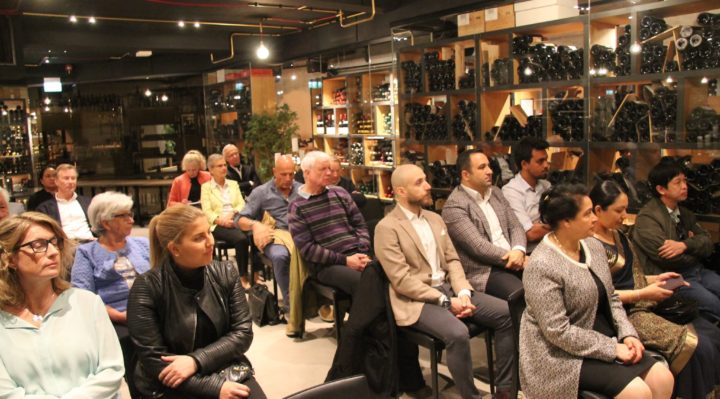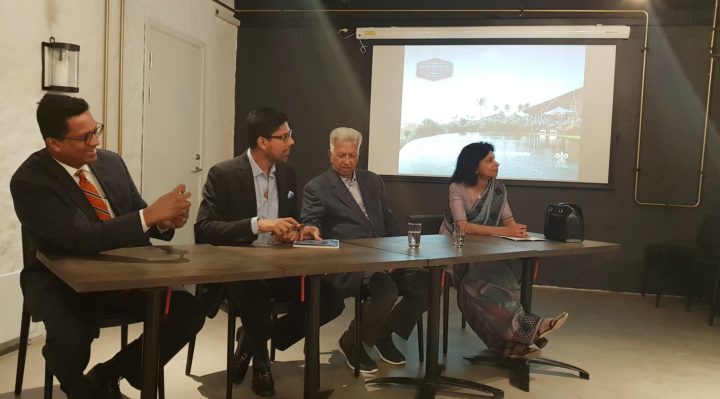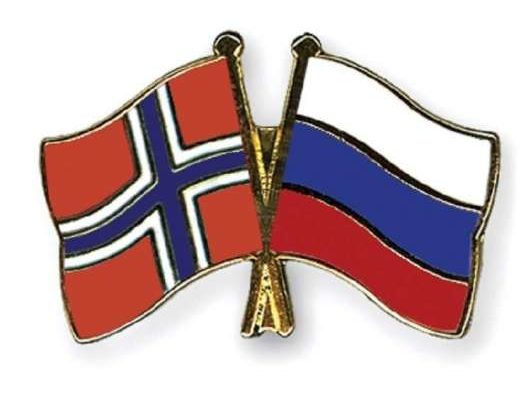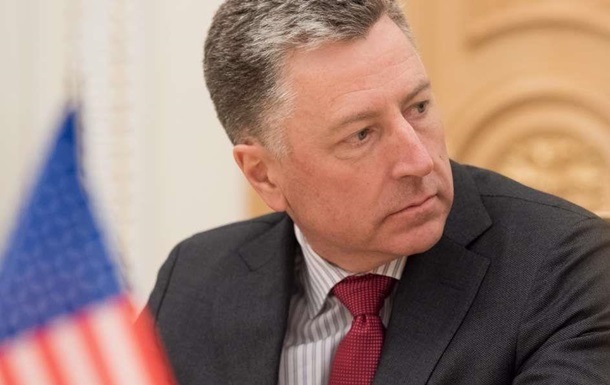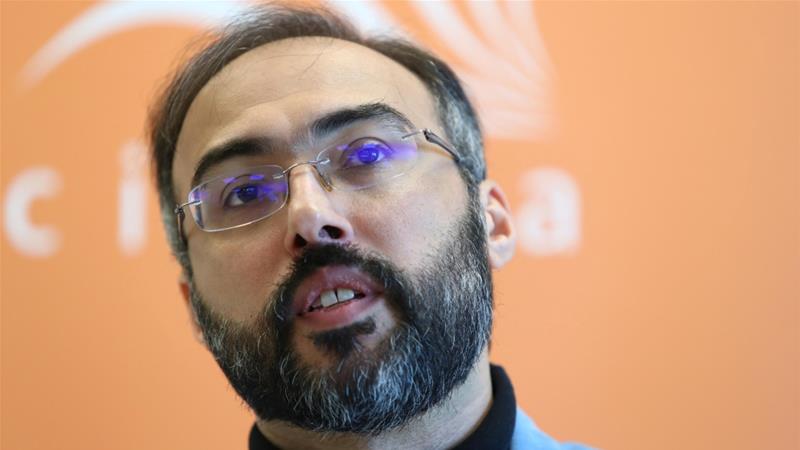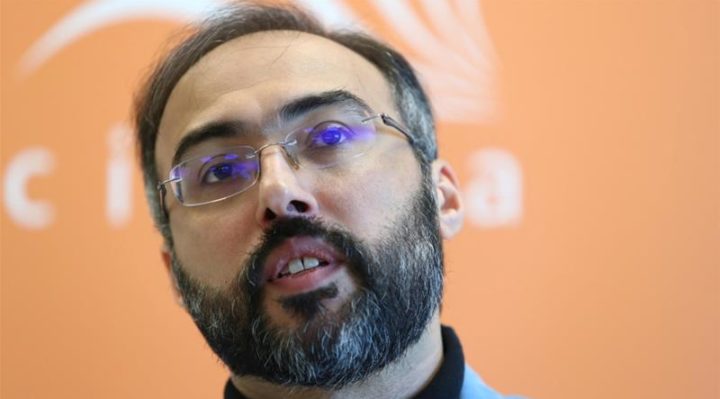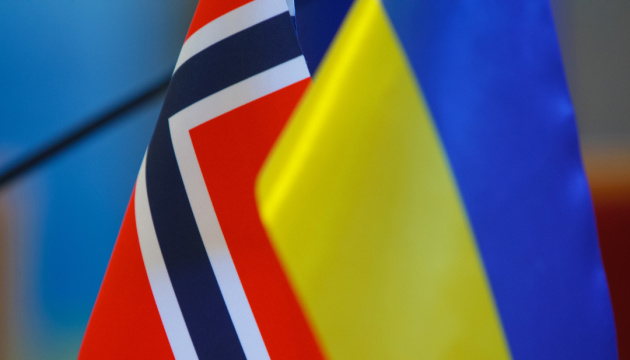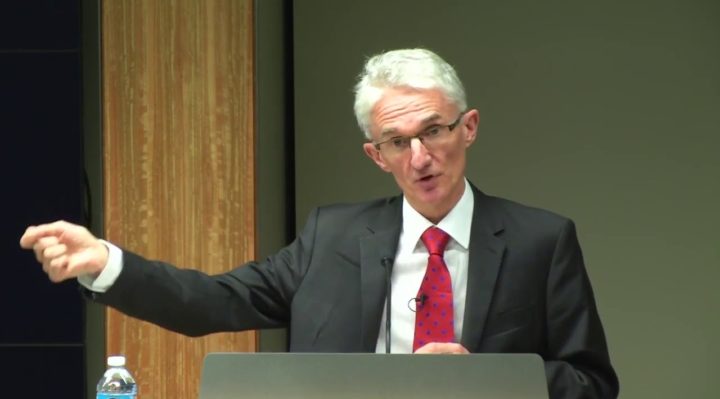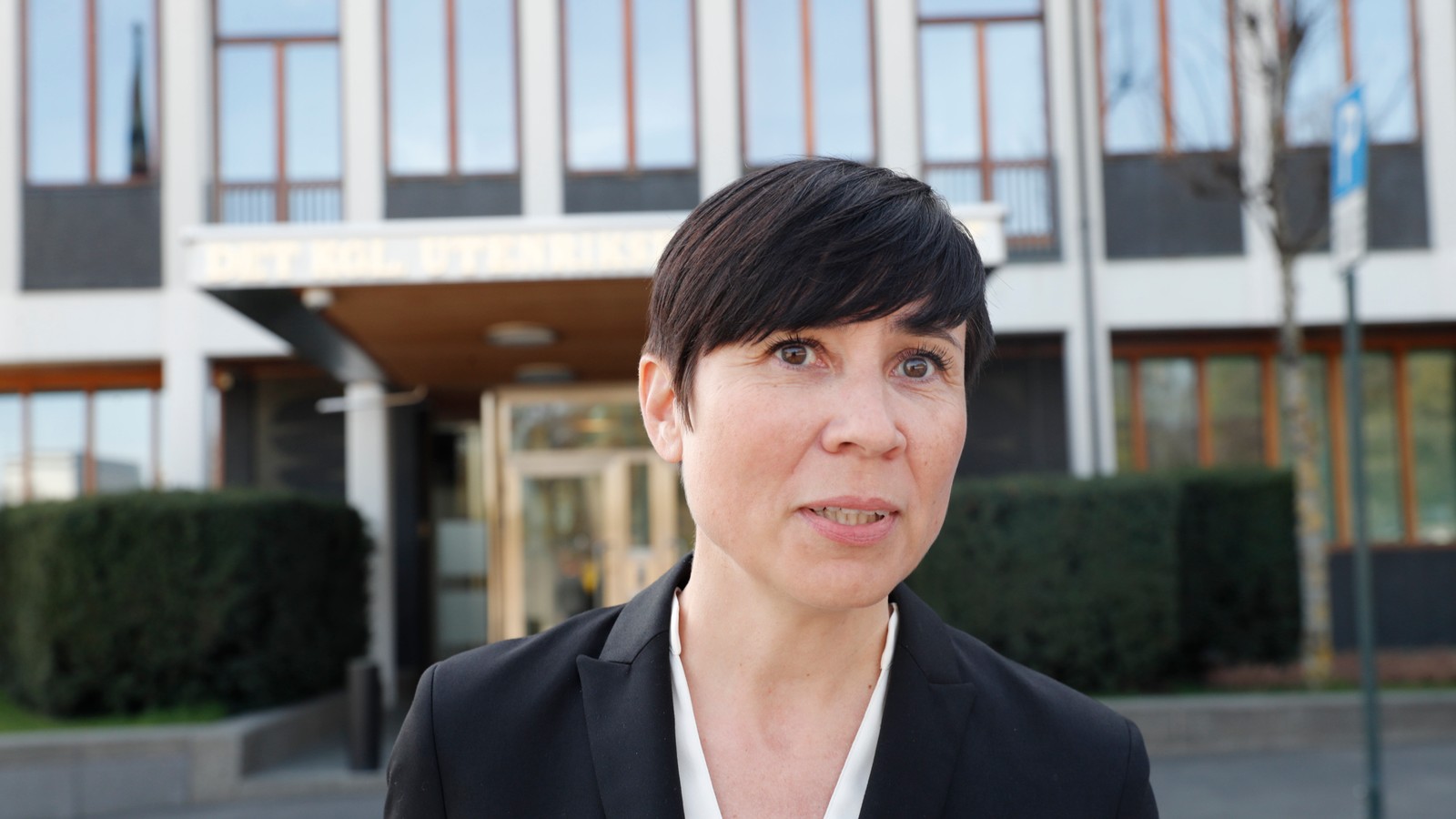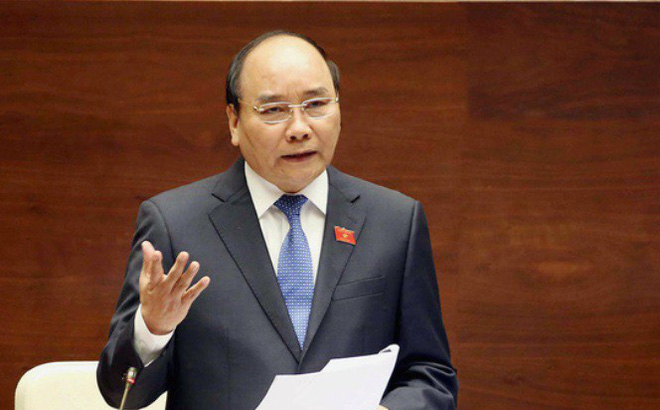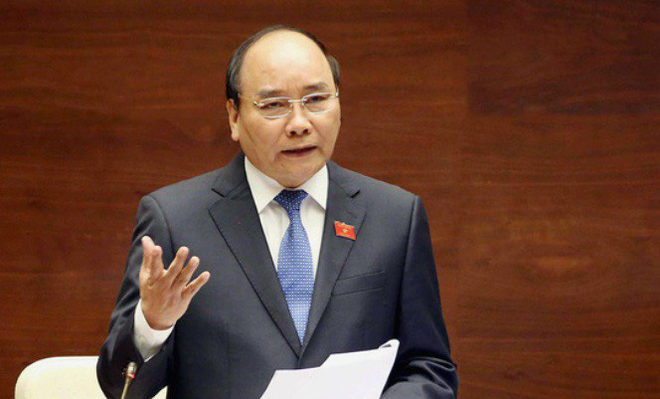Today, Central Eurasia is undergoing another broad transformation, one that may lead to regional cooperation and growth. This was the take-home message from my visit to Kazakhstan last month for the Eurasia Media Forum. Kazakhs will vote for a new President on 9 June and, for the first time since the country’s independence. Diplomats say the winner will certainly be Kassym-Jomart Tokayev, but six other candidates have joined the race.
And speaking of growth, the Central Asian countries have themselves come of age and are increasingly playing roles beyond their region, punching above their relative international weight.
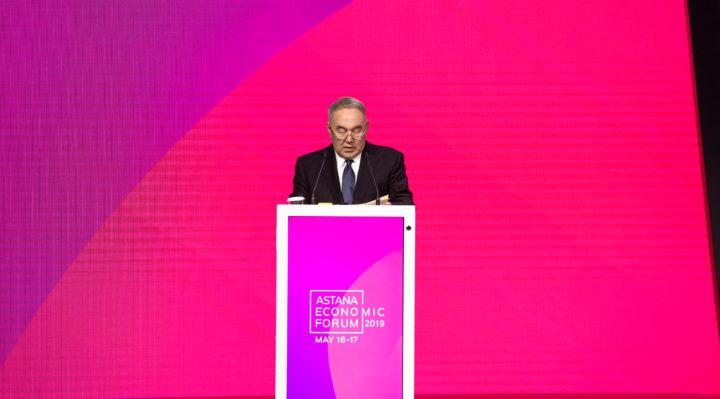
The Republic of Kazakhstan is not the sort of country that you hear about much in Norwegian media. Newspapers and TV networks have limited space, after all, and with so much happening in places like China and the Middle East, the dealings of this land-locked former Soviet territory don’t rate as much ink or airtime. Still, Kazakhstan’s story is significant and often entertaining — it’s a big, rapidly modernizing, resource-rich nation sandwiched between Russia and China — so it was an unusual treat to discover that NORWAYNEWS.com is devoting an entire special report to the country. This updates from Kazakhstan would seem to be a small but important landmark moment for NORWAY NEWS, bringing its enormous readers into contact with a corner of the world they might otherwise never experience.
The first Central Asian country to move beyond natural resources to an industrial and post-industrial, services-based economy is Kazakhstan, which has outperformed not just its “stan” neighbors, but also all other post-Soviet states, including Russia, in terms of the quality and pace of reforms. Only the Baltic States are considered today more developed than Kazakhstan.

As tensions subside, including talk of cooperation on hydropower generation at the huge-mountain dams and water supply for agricultural irrigation, investors are beginning to see Central Asia as a fifty-million-strong market, with consumers starved for goods and services.
As the largest landlocked country in the world, wedged between vying emerging powers Russia and China, sitting on a wealth of oil and mineral deposits, Kazakhstan’s location is unique – and vital. A potential gateway to the Caspian Sea and on to Europe, Kazakhstan’s future economic growth depends heavily on transport infrastructure and regional trade.

The Kazakh capital hosted another Astana Economic Forum, drawing the world’s attention and bringing together influential speakers from Europe, Asia, Africa and America.
The XII Astana Economic Forum, the largest annual business event in Eurasia, took place in Nur-Sultan on 16-17 May. Politicians, investors, economists and world-renowned scientists discussed the global challenges of our time, focusing on the theme of this year’s Forum: “Inspiring growth: people, cities, economies”.
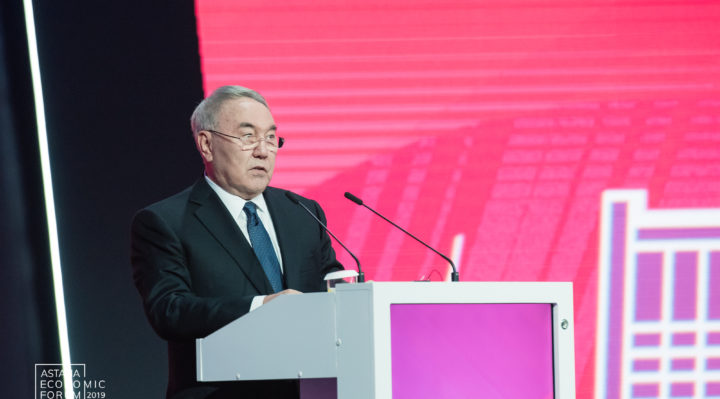
5,600 delegates and 460 speakers from 74 countries participated in the Forum. In addition, 381 journalists from 30 countries covered the event. Six venues were used – the Congress Center, the Hilton Hotel, the Astana International Financial Centre, the Astana Hub, St. the Regis Hotel and the Rixos Hotel.
For the first time in the 12-year history of the Forum, a completely new discussion format, unique for Kazakhstan, was held – the First Kazakhstan Forum on Achieving Sustainable Development Goals. The round table was organized for finance ministers and heads of central banks, with the participation of the International Monetary Fund (IMF). In addition, AEF Talks was organized for students and young people, which included open public lectures and meetings with Nobel laureates and politicians. The press center also organized one-on-one debates among speakers, in front of the media.
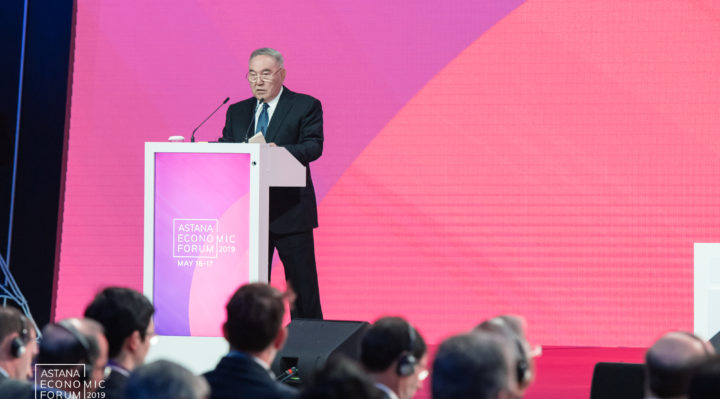
On the first day of the Forum, the plenary session was opened by Nursultan Nazarbayev, the First President of Kazakhstan, who initiated the AEF 12 years ago. He stressed the important role of the Forum in overcoming regional and global challenges.
“Ideas and recommendations discussed here in the past helped Kazakhstan to a great extent react to global challenges in a timely manner and successfully overcome difficulties. Kazakhstan’s development model, despite of all the circumstances and forecasts, proved its sustainability and efficiency. We set ambitious goals and we have reached them”, the First President said.
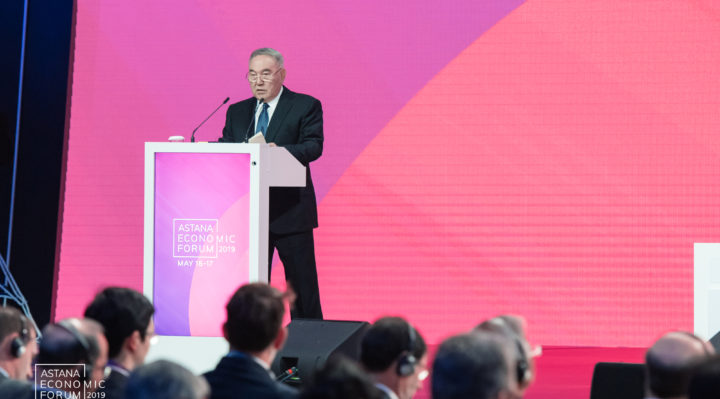
Christine Lagarde, the Managing Director of IMF, began her speech with the words of the famous Kazakh poet Abai Kunanbayev[l1] : “Walking slowly, step confidently.” In her opinion, this wisdom can be the key to developing effective measures to achieve inclusive growth in the countries of the Caucasus and Central Asia. Ms. Lagarde stated that Kazakhstan and other regional countries have great potential for further development.
Christine Lagarde believes that the mediation of Kazakhstan can relieve global tensions.
The Managing Director of the International Monetary Fund, Christine Lagarde, believes that global tensions are expected to decrease in the next six months, and Kazakhstan’s mediation can play an important role. She announced this on Thursday during the plenary session of the XII Astana Economic Forum.

“Our forecast indicated that 75% of the global economy has accelerated over the past two years, however, unfortunately, in 2019 we see that 70% of global GDP slowing down. I am not suggesting that there is a recession, but the slowdown is unambiguous compared to last year, where we see it has decreased from 3.6% to 3.3%.” said Lagarde.
She expressed the hope that next year the GDP will yet again increase to 3.6%, which suggests that “there will be no financial tightening of the belts and no additional risks.” Among the possible risks, she cited international tensions that are found in abundance, in particular between that of the United States and China.

“Although we expect a global economic rebound in the next six months, we cannot be certain. And we hope that the voltages that exist at the moment will be relaxed for certain reasons. And your mediation, perhaps Mr. President Nursultan Nazarbayev, will help with this, ”Lagarde stressed.
In general, the IMF Managing Director stressed that if Central Asia can use the opportunities of financial technologies, as the emerging market countries in other regions have done, this can significantly improve the situation of poor citizens, women and youth.

“In this morning’s session, I’ll look more at increasing inclusiveness within countries, but today’s forum also offers opportunities for expanding ties between countries,” she concluded. “We are expecting a rebound in late 2019, but it seems precarious and vulnerable to downside risks. These include country-related uncertainties, such as Brexit, and broader tension around trade and unease in global financial markets. To address these issues and put growth on a higher and more inclusive path, the world needs strong international cooperation in addition to good domestic policies. Events such as the Astana Economic Forum provide a platform for regional cooperation, she said.
Armen Sarkissian, the President of Armenia, pointed out that not only heads of states, but all people should participate in the creation of a new system. He said: “Avoid calamities, design a world for newly born children. They live in a completely different world. I hope that the system we want to create will survive not only the competition between large countries but the main difficulties of a changing world.”
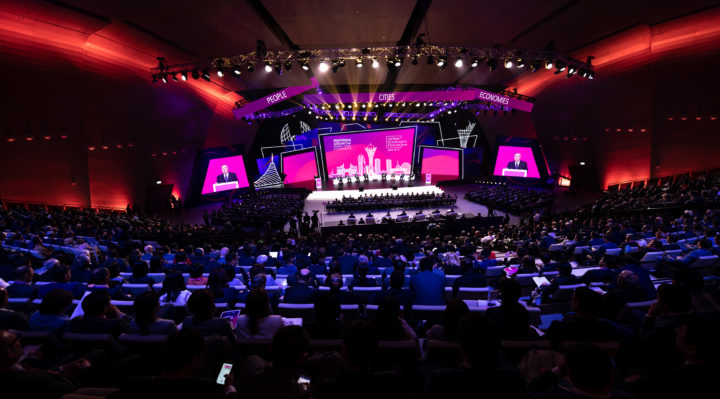
The President of the Republic of Armenia Armen Sarkisiyan believes that the worries about the multi-conceptual world are well grounded and appeals to build a new system. And all people not only presidents have to take part in this process.
“This world changes and people’s voices become louder and louder. For instance, the election of Mister Macron in France. His election took 3-4 months, though nobody knew him at all before. This was thanks to his dialogue with people. This is a new world. Regardless of what we will be building tomorrow, which will happen in 15-20 years, let us not forget that everything will be changing”, – Sarkisiyan imphasized.
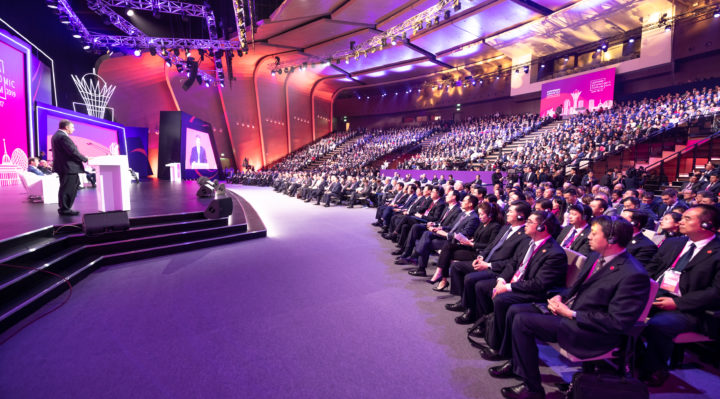
We will also hear from others, including on how the IMF can help.” Hans-Paul Burkner, Chairman of the Board of Directors of BCG: “The Astana Economic Forum over the last few years has proven its status as the most prominent discussion platform in Central Asia, the venue where leaders meet.”
Armida Salsiah Alisjahbana, Deputy Secretary-General of the United Nations, Executive Secretary of the United Nations Economic and Social Commission for Asia and the Pacific (UNESCAP): “The Astana Economic Forum has become one of the most important platforms to engage thought leaders from our region and internationally. I am hoping to have the opportunity to interact with the Forum participants to exchange ideas on regional and global policy issues ranging from inclusive growth, smart cities, technological progress and regional cooperation under the overarching framework of the 2030 Agenda for Sustainable Development.”

Tatiana Valovaya, Member of the Board (Minister) for Integration and Macroeconomics at the Eurasian Economic Commission: “The Astana Economic Forum is always very ‘alive’, subtly reacting to the changes taking place, and setting the tone for finding answers to the current global agenda.
Therefore, many of the questions that are being posed on the world stage today, including the changing economic paradigm, are being discussed at a representative Astana platform with the involvement of a wide range of reputable experts, important politicians and eminent economists.” Kenneth Rogoff, Professor of Economics at Harvard University and Chief Economist of the International Monetary Fund (2001-2003): “After four decades of miracle growth, trend growth in China has fallen significantly, and both China and the world will need to adjust.

The Astana Forum offers an important opportunity to exchange views about these issues, as well as for discussion on risks and opportunities that emerging market economies, especially in Asia, may now face.” Juan Manuel Santos Calderon, President of Colombia (2010-2018), 2016 Nobel Peace Prize Laureate: “Forums like the AEF prove to be of the utmost importance to discuss global challenges, come up with creative solutions and trigger change.
My goal is to mobilize opinion towards a more optimistic outlook on humankind and the challenges ahead. I think that optimism is a necessary quality in order to foster innovation, association between different individuals and much needed for the state of the world today. We are better than we were 20 years ago, now we need to create the necessary conditions to achieve a sustainable future for humankind and the world”, he said.
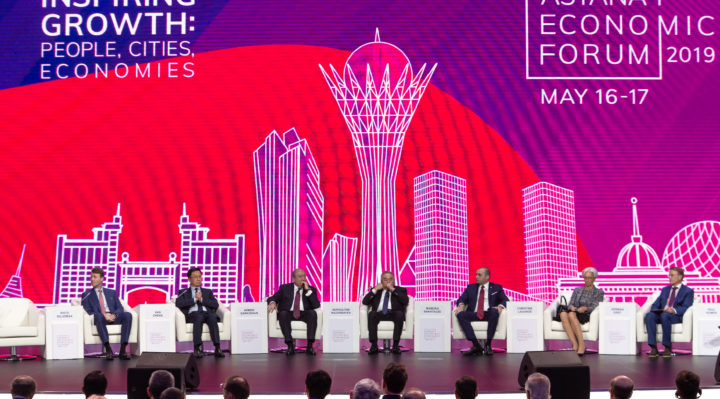
Rae Kwon Chung believes that Kazakhstan and Central Asian countries can cooperate with China as partners of the “One Belt – One Way” project and export renewable energy sources to the PRC and Korea via the Silk Way.
“Korea extremely needs renewable energy to meet our 2030 goals. Korea is ready to import renewable energy.
Kazakhstan can export it through China. An underwater duct is being built from China to Korea. Therefore, it is not a dream, it can all be done in a few days. We need the political will to achieve this goal,” said the Nobel Prize winner.
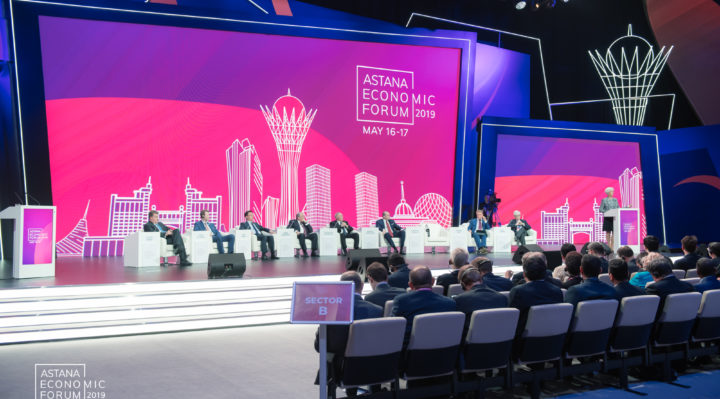
Moreover, today all countries including Kazakhstan need to change their perception of waste management. For example, now, in Korea 3% of renewable energy is being produced from waste.
“We burn garbage and use this energy for heating and for producing electricity. Waste, garbage is now become a new source of renewable energy. The whole world suffers from garbage crisis. However, it can be a source of energy. Therefore, on the one hand, we can solve the problem of this garbage crisis, which is bad for the environment, on the other hand, to create energy. We solve two problems at the same time. This could be a major initiative for Kazakhstan, ”said Rae Kwon Chung.

As Askar Mamin, the Prime Minister of Kazakhstan, noted, the Government of Kazakhstan fully supports the UN on issues of quality, equality, ecology, peace and justice in the world. Most sustainable development goals are very closely embedded in Kazakhstan’s most important plans and strategies. In particular, currently more than 50% of the SDGs indicators are reflected in plans and strategies in development, education, health, environment and other sectors.
The Prime Minister emphasized: “As infrastructure becomes the basis for investment projects, our goal is to develop technological solutions, create opportunities for green investment and their implementation in Kazakhstan and in Central Asian countries. Our country’s deep commitment to the world makes Kazakhstan one of the most peaceful countries of the world.”

However, during the panel session “Towards becoming a top thirty developed countries: the view by rating agencies” at the XII Astana Economic Forum, Arturo Bris, Professor of Finance at IMD and Director of the World Competitiveness Center IMD, said that in order to improve the country’s position in the Global Competitiveness Ranking, Kazakhstan needs to develop the private sector.
Mr Bris said: “What difficulties does Kazakhstan face? In 2018, Kazakhstan’s rankings fell due to external factors, including the drop in oil prices. This is an uncontrollable situation. But we see that in 2019 the economic situation has changed for the better. However there was a serious decline in the competitiveness of Kazakhstan. I would describe it as a unique situation.”

According to the expert, when compiling a competitiveness rating, often most countries face problems in the public sector, while the private sector “carries the economy”. In Kazakhstan, the situation is completely reversed.
“There is a very efficient state machine in Kazakhstan that implements a huge amount of regulations, strategies, well-developed policies that have a long-term vision”, explained the professor.
He noted that competitiveness can be compared to a bicycle. To win, you need a good bicycle and a good racer. And if there is a good bicycle in Kazakhstan, then the problem is in the second component.

Mr Bris explained: “The bicycle in Kazakhstan is the state sector. You have a great state car, good tires, good pedals, good steering. But the one who pedals is the private sector, that’s who you need. You need a private sector that is healthy and adapts to the direction of the bicycle. In this sense, we see difficulties for Kazakhstan. In the coming years, political strategies should be implemented, while at the same time it is necessary to involve the private sector, to create more PPPs, to listen to the private sector.”
According to Kairat Kelimbetov, Governor of the Astana International Financial Center, the development of financial technologies, artificial intelligence and big data in the framework of the so-called fourth industrial revolution, helps the world to create a completely new type of financial centers. Their main priority will be to create a comfortable environment for investors. “Thanks to new technological solutions, the role of financial centers is becoming increasingly important in the modern world”, Kelimbetov stressed.

The Turkish politician announced the interest of Turkish companies to implement joint projects. “If you can save money that comes from oil and gas, create fiscal rules, then you need to direct these resources to improve the quality of education, spend this money on reforms, on creating a research and development ecosystem, on supporting start-ups. Technologies are being successfully implemented only where there is an attractive environment”, the expert concluded.
In addition, Askar Mamin, the Prime Minister of Kazakhstan, noted that all conditions have been created in Kazakhstan for the development of entrepreneurial activity and business.

In 2018 alone, the inflow of foreign direct investment in Kazakhstan increased to billion. The head of the Kazakh government said: “A favourable business climate and our new focus on new and promising industries lead to economic growth. Today, Kazakhstan has the most friendly business environment in the region. Understanding the importance of investments for our economy, we have created a Coordinating Council for attracting foreign investments, and I have been entrusted with the duties of an investment ombudsman.”
As noted by Monika Froehler, CEO of the Ban Ki-moon Centre for Global Citizens, Kazakhstan’s great contribution is not only in bringing together leading experts at AEF platform, but also discussing such ideas as G-Global. In her opinion, work on this direction should be done with “right persons”, she advises to focus and give a chance for participation on this platform to women and youth, and allocate to them more possibilities to work for goals of sustainable development and Climate Change Agreement.

“We should give the women and youth more opportunities, because their demands shape the future. Because we take decisions on their lives. Demands of women and youth are clear: they want to speak now- they are our future. We want equal opportunities in this global transformation. We are the first generation to stop poverty, but the last generation who can do something to prevent climate change. We can stop physical or verbal violence against women. We want to live in a world, free of nuclear threat. Kazakhstan is highly appreciated for efforts, applied in this area. Let us fight the climate change together, before it’s too late”, – proposed Ms Frohler.
According to Sergey Stanovkin, Head of BBC World News regional Representation in Eurasia, G-Global platform is a unique one in many aspects, being Nursultan Nazarbayev’s initiative.
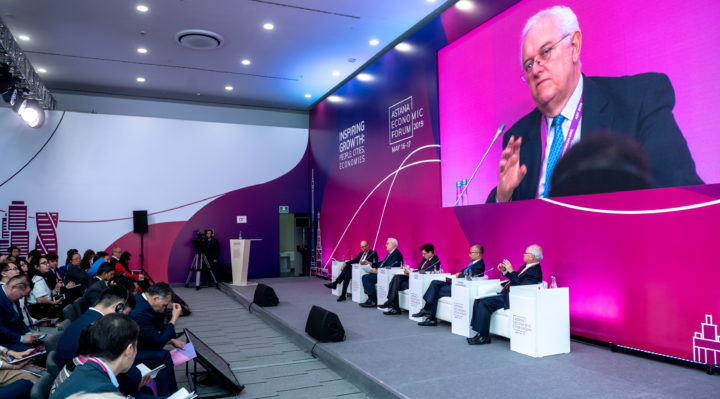
“Kazakhstan is the country, which understands the meaning of love. The country which understands the meaning of friendship. It is the country, which has good relations with the entire world. Living in peace with the world is a unique attribute, you cannot be just smart for this, you must be wise. That is why, G-Global Platform has all the grounds to invite the world on this beautiful trip to the future, great future”, – he said, mentioning, that it is simply necessary to develop communication for this purpose.
Alexander Idrissov, Founder and President of Strategy Partners, outlined key “ingredients”, necessary for transformation of cities. First of all, city management should be keen on this.
“A mayor or governor, interested in promoting digital agenda, looking into the future, being a leader and active driver of changes, is one of the essential success factors”, – he stressed.

According to Justin Lin, Professor, National School of Development, Peking University, People’s Republic of China, Chief Economist and Senior Vice President of the World Bank (2008-2012), high tension between the USA and China, and the atmosphere of volatility, lack of clarity and uncertainty should be discussed today.
“We can talk on need for negotiations and some transactions in these bilateral relations. Unconditionally, there are a lot of details, in particular geopolitical problems, that are too obvious. It is a geopolitical rivalry between the USA and China. The USA is in “jealous” position towards rapidly developing China. This struggle for global influence creates very volatile environment,” – thinks Mr. Lin.
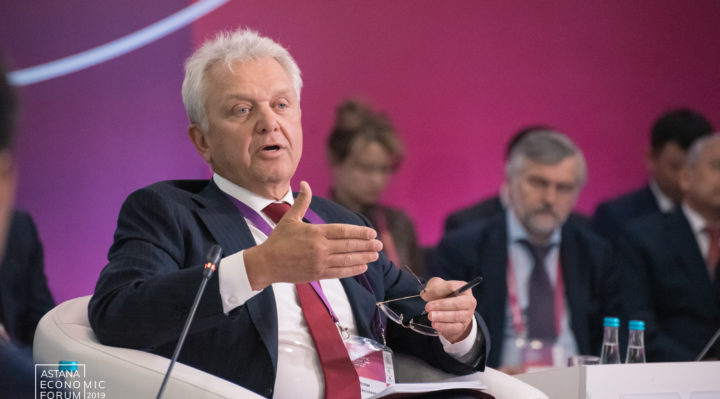
Dauren Abayev, the Minister of Information and social development of the Republic of Kazakhstan expressed this point of view today, at XII Astana Economic Forum, in the framework of panel session “Involvement of civil society in wellbeing policy”.
“During 28 years of Kazakhstan’s independence, every year we observe growth of GDP. But have citizens of Kazakhstan become happier to some extent, over these 28 years? We must think on this and discuss it. If overcoming the point of no return to poverty was a key goal for many countries in ХХ century, today the bar for us are such subjective concepts and happiness and wellbeing”, – stated Mr. Abayev.

As an example, he took the World Happiness report. Its composers base it on such criteria as GDP per capita, social support and expected life span. As a result, leading positions are occupied by Finland, Denmark, Norway and Iceland. Alongside with that, a very interesting experience was presented by the New Economy Fund, which has developed its own unique index, based on subjective life satisfaction.
“In 2012, Costa Rica, Vietnam and Colombia took the first places in this index. Since 2011, the OECD has been conducting a comprehensive study to measure a better life index. The index identifies 2 groups of well-being parameters. The first group includes such material criteria as housing conditions, revenue from work. The second group is education, ecology, civil rights, state of health, life satisfaction, safety, balance of work and personal life,” – said Abayev.
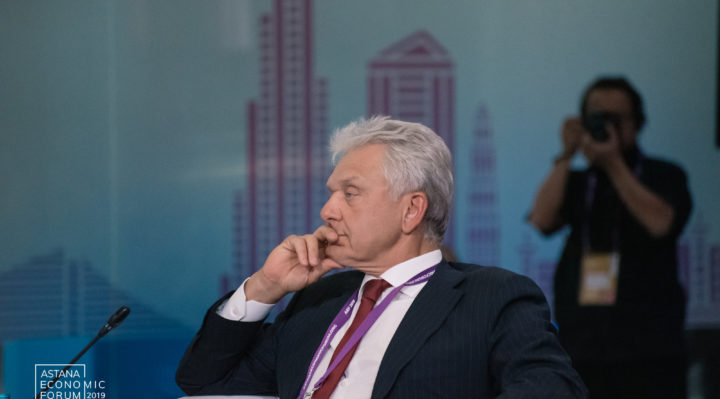
“Avoid calamities, design the world for the recently born children. They live in an absolutely different world. I hope the world that we want to create and the system that we want to establish, they will outlive the competition between the major countries and the main problems of the changing world”, – said the President of Armenia at the international conference devoted to the 100th anniversary of the International Labor Organization held as a part of the XII Astana Economic Forum.
Sberbank CEO Herman Gref, who is known for his passion for education, said: “We are all students. We try to be guided by the principle of Mahatma Gandhi – ‘Live as if you were going to die tomorrow. Learn as if you would live forever’.”

Other Forum participants voiced the following opinions: Jeffrey Sachs, Professor at the Columbia University: “Kazakhstan is one of the leaders in the field of commitment to peace”;
Armida Salsiah Alisjahbana, Under-Secretary-General of the UN and Executive Secretary of the United Nations Economic and Social Commission for Asia and the Pacific: “Kazakhstan has great potential for achieving sustainable development goals”; Juan Manuel Santos, former President of Columbia and Nobel Peace Prize winner in 2016: “Over the past few years, the progress of the sustainable development goals has been phenomenal, but this is not enough”;

Chairman of Azerbaijan Railways Javid Gurbanov and Director General of Baku international Sea Trade Port Taleh Ziyadov attended the 10th Astana Economic Forum.
Stanley Fischer, former Vice Chairman of the US Federal Reserve Board of Governors: “Productivity growth is very difficult to predict. We just do everything in our power. ”
The AEF has always been a platform for concluding important agreements and memorandums. This time is no different. 43 agreements were signed at the Kazakhstan Global Investment Roundtable, totaling 8.7 billion dollars.
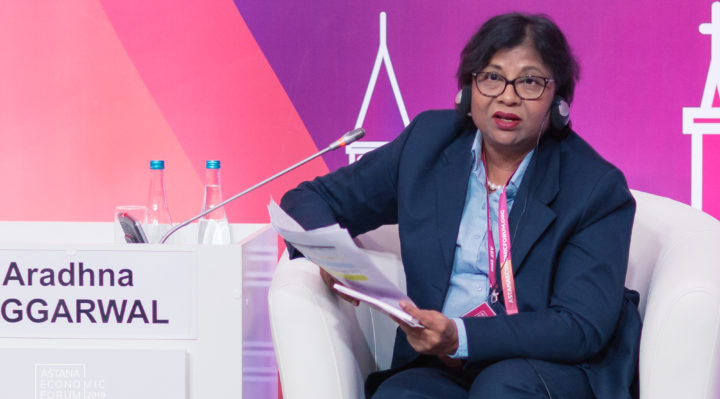
In particular, in the field of gas chemistry, the Mayor’s Office of the Mangystau region and Singaporean company Westgasoil signed an agreement on cooperation in the project of methanol and olefins production. The implementation of the project will localize the production of chemical products and promote export through the development of the gas chemical industry of Kazakhstan.
In order to develop exports, Yıldirim Holding (Turkey) and the Mayor’s Office of the Zhambyl region signed an agreement on the construction of a soda ash plant in the Zhambyl region, with the design capacity of 400,000 tons per year.
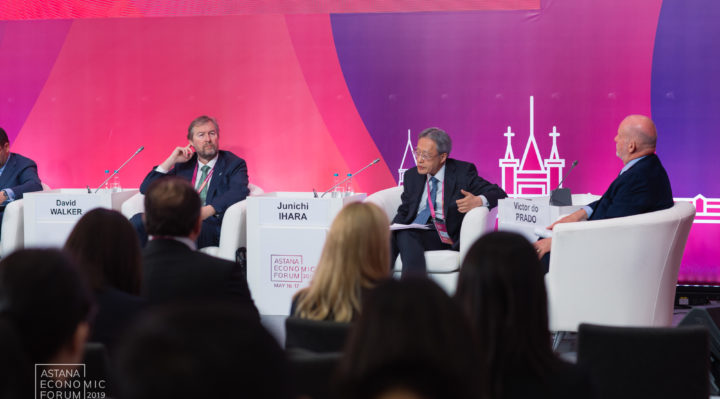
An agreement was also signed between KAZAKH INVEST and the Russian investor of Agricultural Industrial Holding “ECO-Culture” to construct greenhouse complexes, in order to export agricultural products. In the food industry, a Memorandum of Cooperation was signed by the Mayor’s Office of the Pavlodar region and the Beijing NAALE GROUP (China) for the construction of a sugar factory.
In the field of transport and logistics, YDA Holding (Turkey) signed an agreement with the Mayor’s Office of the Turkestan region on the construction and operation of an international airport. This will be the first airport in the history of Kazakhstan constructed from scratch. In addition, an agreement was signed by KAZAKH INVEST and the AEON Corporation (Russia) to create a logistics hub on the territory of the international airport in Aktobe.

In the mining and metallurgy sector, an agreement was reached between Canarax Trading LLC (UAE) and the Mayor’s Office of the Pavlodar region on the production of technical silicon with the prospect 165,000 tons per year capacity. The plant’s products will be used for the production of metal alloys, organic compounds, electronics and solar energy.
In the field of healthcare, an agreement was signed with the Shanghai Constructions Group (China) on the construction of a multidisciplinary clinic with 1,000 beds in Shymkent. It is planned that the state of the art clinic, equipped with new technologies and tools, will provide a full range of medical services and will become the only center of proton therapy in Central Asia.
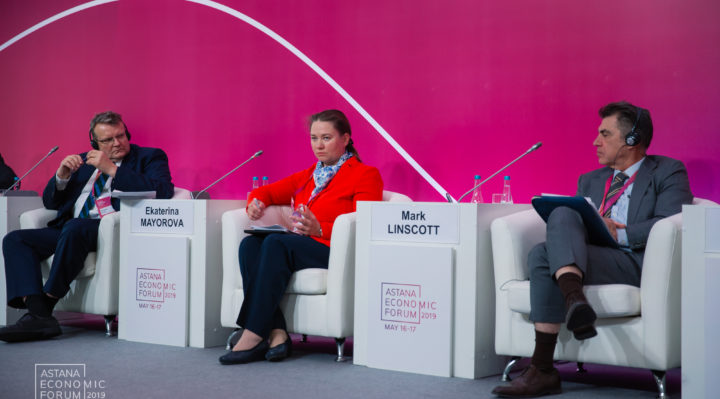
In the field of education, a Road Map for the implementation of the project “Construction of an Educational Metropolis – Kindergarten, School, College, University” was signed with Singaporean investor Kinder World in three cities: Nur-Sultan, Almaty and Shymkent. In the coming years, a network of international schools, colleges and universities will be built in the capital of Kazakhstan.
In addition, agreements were reached on projects such as the construction of data centers and the implementation of 5G in Kazakhstan.
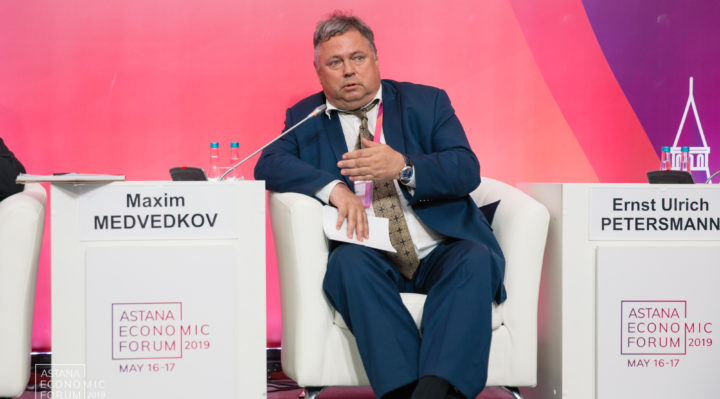
A memorandum of understanding was signed between the Eurasian Economic Commission (EEC) and the United Nations Economic and Social Commission for Asia and the Pacific (UNESCAP). The document was endorsed by Timur Zhaksylykov, a member of the EEC collegium, and Armida Salsiah Alisjahbana, Deputy Secretary-General of the United Nations, Executive Secretary of UNESCAP.
The Astana Economic Forum was established by the initiative of Elbasy Nursultan Nazarbayev, is always held with his participation. AEF-2019 is not an exception. First President of the Republic of Kazakhstan taken part in the plenary session of the forum.

Survey is prepared by «Economic Research Institute» JSC and dedicated to XII Astana Economic Forum. The main purpose of this document is to analyze international and world trends and extrapolate them to Kazakhstan. In modern conditions, it is necessary to understand our development directions and keep «synchronizing watches» with international economic situation.
«Astana Economic Forum has become one of the most important platforms to engage thought leaders from our region and internationally. AEF became opportunity to interact with the Forum participants to exchange ideas on regional and global policy issues ranging from inclusive growth, smart cities, technological progress and regional cooperation under the overarching framework of the 2030 Agenda for Sustainable Development», – says Armida Salsiah Alisjahbana, Executive Secretary, United Nations Economic and Social Commission for Asia and the Pacific.

The Kazakhstan Economic Research Institute published an analytical review “Kazakhstan and the Global World: Challenges and Opportunities”. According to Yerlik Karazhan, the Chair of the Board of the Institute: “We want to demonstrate to the world the level of Kazakhstan’s participation in solving key global problems, the country’s focus on open development, and readiness to search for effective solutions in various sectors.”
For the first time in 11 years of the Astana Economic Forum presented AEF Talks format, targeted to young people and students.

Astana Economic Forum is not just a platform designed to discuss the most important problems of the world economy, but also a place for an effective exchange of experience, development of the partnership, promotion of the most ambitious ideas and innovative projects.
The subject of the Astana Economic Forum is updated annually and covers a wide range of issues and objectives of global development. The main theme of AEF-2019 is INSPIRING GROWTH: PEOPLE, CITIES, ECONOMICS is divided to five key areas: the global agenda; regional macroeconomics agenda; cities of the future; technology agenda; human capital and inclusive development of Kazakhstan.

The Astana Economic Forum is the flagship business event in Eurasia. Kazakhstan’s strategic task is to join the top 30 most developed global economies. The country is entering a new period of development, with emphasis being made on breakthrough scientific, technological and economic development, reducing corruption, and raising living standards. The Government’s work to increase the country’s competitive potential is directly reflected in well-known global rankings, including WEF’s Global Competitiveness Report, IMD World Competitiveness Rankings, World Bank’s ‘Doing Business’ ranking, and the Corruption Perceptions Index. Kazakhstan already ranks 28th in the latest ‘Doing Business’ report, is not in the list of the most corrupt countries in the world, according to Transparency International, and is showing steady growth in the PRS Group and IHS Markit ratings.

The Astana International Financial Centre (AIFC) and World Islamic Economic Forum Foundation recently signed an agreement to hold World Islamic Economic Forum (WIEF) in Astana on July 4. The forum will attract more attention to the AIFC and promote it as a regional hub of Islamic finance.
Kazakhstan’s new International Centre for Green Technologies and Investment Projects was presented during the Astana Economic Forum called Global Challenges Summit during a panel discussion by high officials and experts on the project.
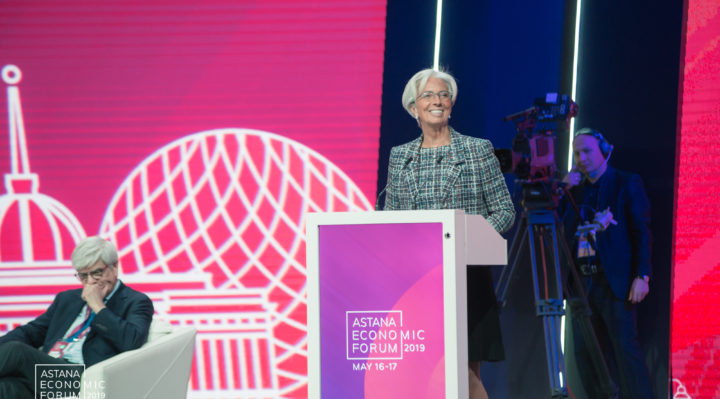
Kazakhstan intends to increase its contribution to UN peacekeeping operations, said Kairat Umarov, Kazakhstan’s Permanent Representative to the UN stated.
Routes Silk Road 2019 approved the Kazakh capital as the next forum venue to discuss and develop air routes for the Commonwealth of Independent States (CIS), Central and Eastern Europe and the Middle East. The Astana Economic Forum is an opportunity for international dialogue, discussion and brainstorming on a range of economic issues facing Central Asia and the rest of the world.

During the 12th annual Astana Economic Forum taking place in Nur-Sultan, President of the Republic of Armenia Armen Sarkissian met with Chairman of the Board of Directors of the famous Nokia Corporation Risto Siilasmaa. Georgia’s Prime Minister Mamuka Bakhtadze announced that together with Kazakhstan, the country will offer international companies joint logistics projects.
“I would like to take this opportunity and express my great respect to First President of Kazakhstan Nursultan Nazarbayev who was the initiator of the forum and express high recognition to the Government of Kazakhstan for the high level of the forum,” Vice Premier of the State Council of China Han Zheng said, taking the floor at the XII Astana Economic Forum. Turkic-speaking States established the Joint Chambers of Commerce and Industry at the signing ceremony organized by the Turkic Council Secretariat in Nur-Sultan (former Astana) as part of the Astana Economic Forum, Trend reports via the press office the Turkic Council.

The AEF is the global discussion platform in Central Asia. Since the launch of the AEF eleven years ago, the event has become one of the most influential international platforms for discussing issues of the world economy and the financial system. Over 50,000 delegates participated in the forum from 150 countries, including more than 20 Nobel laureates and 30 high-level foreign political figures.
As a result of previous Forums, more than 300 memorandums and agreements have been signed worth more than billion.
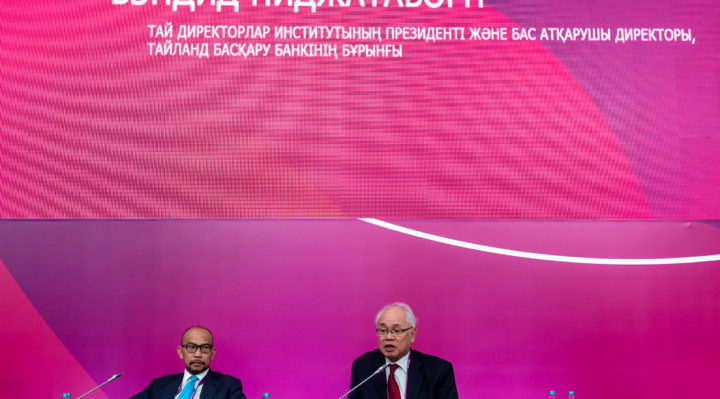
The theme of the AEF is updated annually and covers various global development issues, and sets the direction for a wide range of discussions.
The international media noted the effectiveness and credibility of the Forum. Euronews described the AEF as one of the most influential international platforms, where issues of the development and restoration of the world economy and the financial system are being discussed. Bloomberg also considers the AEF the main discussion platform in Central Asia: “Since the launch of the Forum 11 years ago, the event has become one of the most influential international platforms for discussing the issues of the world economy”.
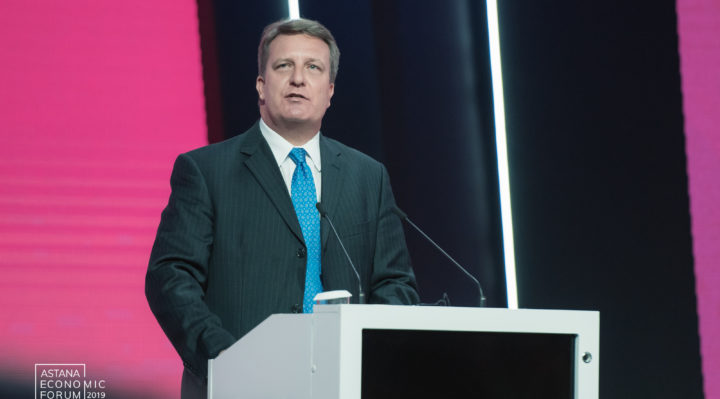
The Forum’s foreign guests noted the high level of organization of the event, including excellent planning at the venues, developed infrastructure, interesting discussion formats, a memorable opening ceremony of the plenary session and an original design of the halls. Many participants shared the opinion that “the AEF was free from the official narrative, the communication was highly valued here.” The productive, lively dialogues fully correspond with the concept of the Astana Economic Forum.

These are the results of the AEF-2019, organized this year by Astana EXPO-2017. The next 2020 Forum is promising to be just as spectacular as this year.
